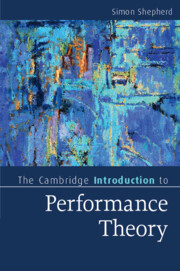Book contents
- Frontmatter
- Contents
- Preface
- Part I Definitions of performance
- Part II The emergence of performance as sensuous practice
- Part III Theorising performance
- 15 Performance, postmodernism and critical theory
- 16 What Performance Studies is: version 1: New York and Northwestern
- 17 What Performance Studies is: version 2: Oral interpretation
- 18 How Performance Studies emerged
- 19 Gender performativity
- 20 Performance and performativity
- 21 The relations between performance, theatre and text
- 22 The magic of performance
- Closing note
- References
- Index
- Cambridge Introductions to …
15 - Performance, postmodernism and critical theory
from Part III - Theorising performance
Published online by Cambridge University Press: 05 February 2016
- Frontmatter
- Contents
- Preface
- Part I Definitions of performance
- Part II The emergence of performance as sensuous practice
- Part III Theorising performance
- 15 Performance, postmodernism and critical theory
- 16 What Performance Studies is: version 1: New York and Northwestern
- 17 What Performance Studies is: version 2: Oral interpretation
- 18 How Performance Studies emerged
- 19 Gender performativity
- 20 Performance and performativity
- 21 The relations between performance, theatre and text
- 22 The magic of performance
- Closing note
- References
- Index
- Cambridge Introductions to …
Summary
A feeling of the new disciplinary shaping is suggested by the programme for the first few years of the Milwaukee Center for Twentieth Century Studies. Founded in that seminal year 1968 its activities gathered steam in the early seventies. Although there were seminars on subjects across the humanities, photography features frequently at the start. Then in 1973 there was a symposium on the ‘Self-Reflective Artwork in Contemporary Literature and Art’, followed later by a week of events on French women artists and thinkers. For 1975–1976 the theme was Film, with a symposium in November 1975. This, though, was the mid-seventies and discussions of art and ideas were never far away from economics: in September 1975 there was a conference on Public Taxing and the Humanities in Multi-Campus University Systems. Then in 1976–1977 the theme was Performance, with talks by Umberto Eco, Ionesco, Herbert Blau and Victor Turner, and a symposium in November 1976. The next year the theme was Technology and the Humanities.
The programming showed awareness of, and desire to respond to, emergent subjects and trends. That response was made by drawing on ways of thinking that seemed appropriate to the various innovations and that were, themselves, undergoing change. New theoretical models were building on and revising traditional psychoanalysis and Marxism, pushing structuralism into poststructuralism, rethinking historiography, circulating intensely around notions of ideology, discourse and the subject – all the various elements that came to be named, with a capital letter, Theory.
Like similar research centres elsewhere the Milwaukee Center was seeking to think about new materials in a new way. Its declared intention was to ‘sift theories of contemporary culture’, and this it formally commenced with its first publication, based on the November 1976 event, ‘The International Symposium on Postmodern Performance’. The insertion of the word ‘Postmodern’ both aligns this sort of ‘Performance’ with an area of contemporary concern and marks it off from anything else which might be known as performance. What makes it so special in postmodernity, and a worthy subject for the Milwaukee Center's first publication, is that, according to the Center's director, Michel Benamou, performance is ‘the unifying mode of the arts in our time’ (1977a: n.p.).
Performance, as a concept, can take on this role because of its range of application, which Benamou differentiates into three ‘aspects’: ‘the dramatization of life by the media, the playfulness of art, …
- Type
- Chapter
- Information
- The Cambridge Introduction to Performance Theory , pp. 139 - 150Publisher: Cambridge University PressPrint publication year: 2016

